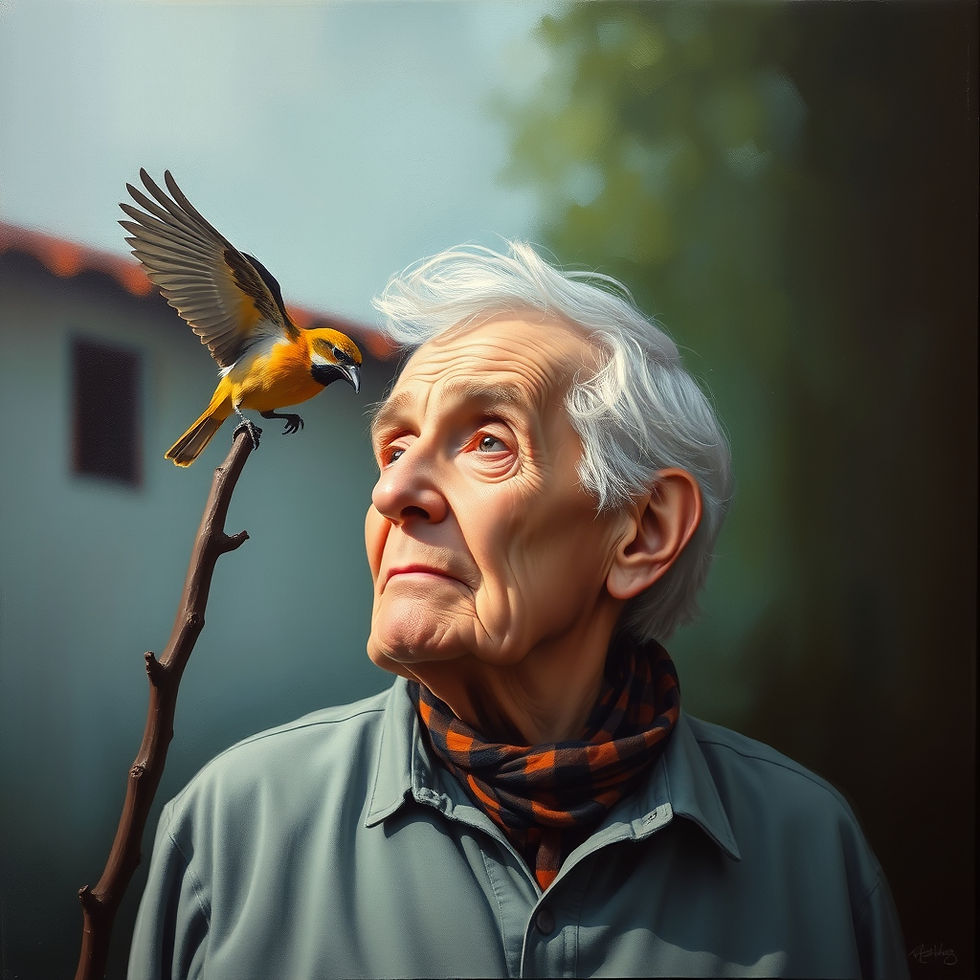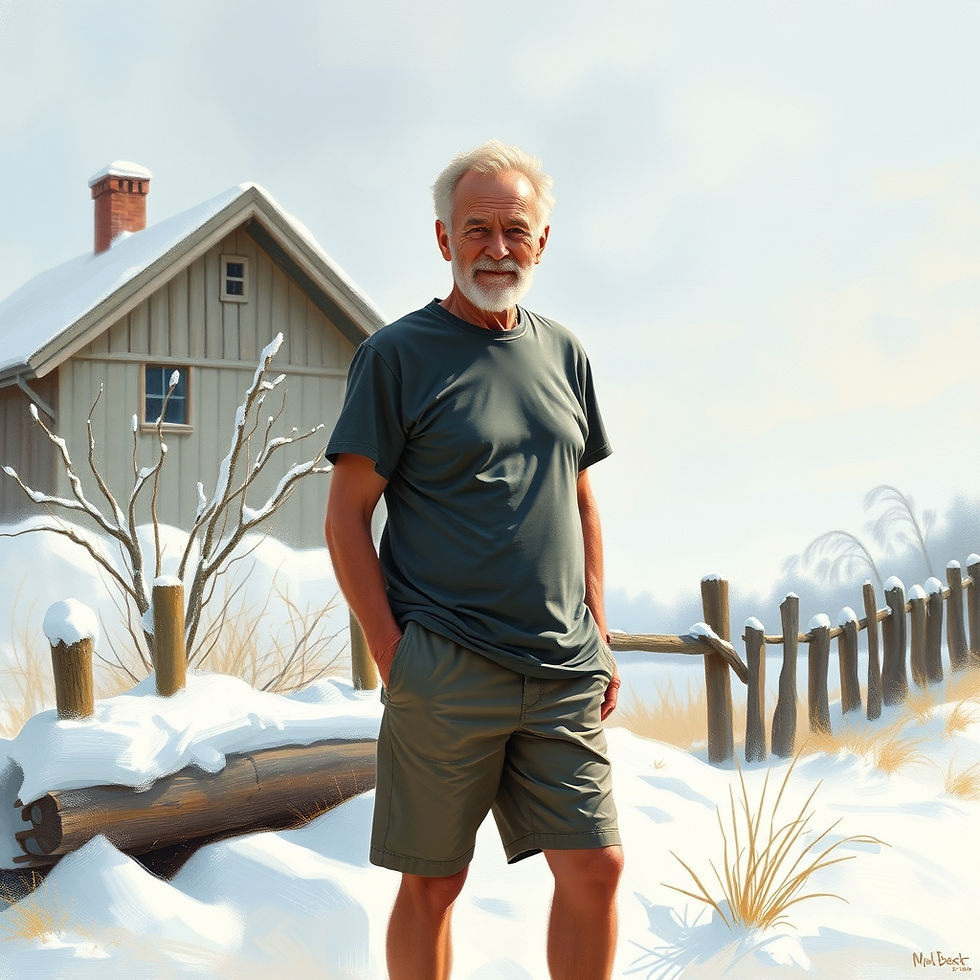The Inner Game (of Everything, Especially Aging): How quieting our inner critic may unlock vitality, wisdom, and joy
- drjunedarling1
- Aug 19, 2025
- 5 min read
Both Arthur Ashe and Billie Jean King used these phrases ("playing out of one's mind," or "over one's head") to describe their performances while winning the finals at Wimbledon in 1975. . . . The player loses himself in the action, continually breaking the false limits placed on his potential. Awareness becomes acutely heightened, while analysis, anxiety and self-conscious thought are completely forgotten. Enjoyment is at a peak - pure and unspoiled. Timothy Gallwey

Timothy Gallwey wasn’t writing about aging when he penned The Inner Game of Tennis in the 1970s. He was teaching athletes how to stop sabotaging themselves with worry and criticism. Yet, as I browse through the 50th anniversary edition, it seems that his wisdom may be just as crucial for those of us growing older as it is for anyone picking up a racket, a golf club, or a musical instrument. In fact this was one of the first concepts I learned as a life-coach some thirty years ago - that the biggest issue in high performance is learning how to get out of one's own way.
Gallwey said we all carry two “selves.” Self 1 is the noisy inner critic, always judging, always controlling. You’re too slow now. You’ll never keep up. Don’t even try. Self 2 is quieter but infinitely wiser. It’s the self that knows how to learn, adapt, and move through life without interference—the one that remembers how to ride a bike, laugh freely, or comfort a friend without rehearsing the lines.

Performance, Gallwey argued, isn’t about "trying harder." It’s about reducing the interference of Self 1 so that Self 2 can shine. That message rings especially true when it comes to aging. The biggest obstacle in later life isn’t usually our bodies—it’s the interference of our minds.
A big problem in any performance is our inner critic, our judger. Gallwey taught players to switch from judging to noticing, to clear-headed awareness. Instead of groaning, “that was a terrible shot,” he suggested simply observing, “The ball landed two feet long.” Awareness without judgment helps the body adjust naturally.
Neuroscience now backs him up. When we notice without labeling ourselves as failures, the brain’s natural error-correcting system—the anterior cingulate cortex—quietly helps us learn and adapt. Judgment and shame, on the other hand, flood us with stress hormones that interfere with memory and focus.
For aging, this is liberating. My knees hurt today. I forgot that name. I nap more than I once did. These are facts, not verdicts. Awareness lets us adjust wisely. Judgment locks us in fear.
Here is a story of my friend, Karen. In her seventies, she decided to learn pickleball. The first few games were humbling. Her joints were stiff, her reflexes slower than she remembered. After missing an easy shot, Self 1 piped up: You’re too old for this. Everyone’s laughing.

But Karen and I had talked about Gallwey’s work years before. She reminded herself about what she had learned. She learned to say to herself, “The ball bounced before I swung.” That’s all. She noticed without judgment. She gave Self 1 something to focus on—the sound of the paddle meeting the ball—and let Self 2 take care of the rest.
In no time, her game had improved dramatically. More importantly, she was laughing, connecting, and feeling alive. Karen had stumbled onto the inner game of aging: letting go of interference, choosing awareness, and trusting that she still had potential to explore.
And science agrees. Brain research shows that older adults continue to grow new neural connections when learning new skills—a concept called neuroplasticity. It’s not youth alone that fuels growth, but practice and openness.
Gallwey had a fairly famous and exceedingly simple formula for performance. Performance = Potential – Interference.
Imagine applying that to aging. Our potential includes wisdom, perspective, humor, compassion, and creativity. The interference? Self-doubt, stereotypes, fear of decline. Remove the interference, and the potential shines through.

Neuroscientists now know that chronic negative thoughts can shrink parts of the brain tied to memory and resilience. By loosening the grip of Self 1 and cultivating curiosity instead, we literally support brain health as we age.
The issue then is how to quiet Self 1 and trust Self 2. On the court, Gallwey calmed Self 1 by having players focus on the seams of the ball or their breathing. As we age, we might quiet Self 1 by savoring the present moment: the smell of morning coffee, the voice of a friend, the feel of warm sun.

Mindfulness researchers confirm that this simple shift of attention lowers activity in the brain’s “default mode network,” the area tied to self-criticism and rumination. It helps the brain reset toward calm and focus—exactly what Gallwey saw on the tennis court. (And maybe saying our fears out loud to another helps to quiet that noisy Self 1.)
And we can trust Self 2. Trust that we can still contribute. Trust that our presence matters. Trust that life keeps unfolding—even in limitations—with surprises and gifts.
In our daily lives then, how might we notice without judgment (or at least not getting hung up there)? Stay anchored in the present? Trust the wisdom and resilience that life has already built in us?
Here are three practices we can use to experiment with to build our inner game of aging well. (And I can’t help notice how these line up quite well with self-compassion and mindfulness.)
Notice, Don’t Judge: The next time you forget a name, simply say, “That name isn’t coming right now,” instead of, “I’m losing my memory.” Awareness strengthens natural recall. Judgment activates stress that blocks it. (Here’s one little trick I’ve learned. I ask myself after someone new tells me their name, “How likely are you to remember this name?” That helps me become more aware, bring the name back to mind, or ask for it again, and get it more solidly implanted. A lot of “forgetting” is never actually learning it in the first place…giving it solid attention.)

Give Self 1 a Job: When anxious thoughts swirl, redirect attention. Focus on your breath, the taste of tea, or the sound of birds. Neuroscience shows this calms brain regions tied to worry and frees space for calm action. (Now I don't think Gallwey talks about this, but funny things, humor, can really give Self 1 something to do. John and I went to see the movie, Naked Gun. It is the stupidest movie I have ever seen. And...I laughed my head off. Humor stimulates cognitive flexibility. Reduces stress hormones like cortisol and promotes a more relaxed.... AND...this and is a big and, boosts hope. Another big AND...hope boosts meaning. Big bonuses.)


Trust Self 2: Recall something you’ve mastered in your life. Remind yourself: If I learned that, I can learn something new now. That trust activates the brain’s natural learning circuits—even in later years.

The outer game of aging will leave its marks—wrinkles, slower steps, aching joints. But the inner game is ours to play. And as Gallwey showed us, when we step out of our own way, Self 2 has a way of revealing just how much beauty, vitality, and possibility still live within us.
How might we journey together to The Good Life by playing the inner game of aging well – learning how to quiet our negative, limiting judgments; increase awareness, and trust our natural ability?



Comments